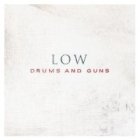Low, Drums and Guns
by paul r jaissle

There are few bands more aptly named than Duluth Minnesota’s own Low. The mood that hangs over their records is one of despair: a sort of existential longing that makes their often-glacial tempo smolder with a hunger for meaning. Their latest album, Drums and Guns is no different. It is a stark, difficult album that is hard to penetrate at first, but its mystery slowly fades with each listen. In the broadest terms this is an anti-war record. In fact, it is the most eloquent anti-war record the current war in Iraq has inspired.
The band’s last album, 2005’s The Great Destroyer, saw new sounds and textures creeping into the band’s palate. The result was a mixed album that never seems sure the feeling it is trying to convey. The much brighter, more typically “rock” sounding guitars suited the more optimistic feel of the record, but at times seemed to overshadow the very elements that made the band so unique in the first point. Drums and Guns continues with the same streak of experimentation but with much more familiar results. The biggest shift sonically is the use of drum machines. In that past, Mimi Parker’s thunderous, yet dirge-like drums held together the band’s slow and steady tempos. Now, a variety of glitches, handclaps and electronic sounds fill in the rhythm sections of these songs. These new elements do not alter the band’s core sound, but rather just shade it with new light: there are still the signature empty spaces and chilling vocal harmonies that highlight their best work.
‘Belarus,’ for example, features samples of Parker’s voice and strings over steady beeps and clicks, but when Parker and Sparhawk sing together, the familiar Low sound trumps any unexpected bells and whistles in the production. ‘Breaker’ is an even better example of these new touches: it is a skeletal song made up mostly of hand claps, syncopated samples beats and organ. It lulls the listener so that when Sparhawk’s guitar joins in, the result is truly jarring. While most of the songs here make use of these new tricks, the album closer, ‘Violent Past,’ comes the closest to a familiar Low sound: groaning organ chords, slow drum rhythms, and soaring harmonized vocals. The song ranks among the best the band has ever done, and provides yet another compelling case for Low’s growing genius.
The album’s real strength, however, is that it is never weighed down by this weightiest of issues. The album beings with Sparhawk intoning the lines “All the soldiers, they’re all gonna die/All the little babies, they’re all gonna die.” Not the most uplifting way to begin a record, but Low isn’t the sort of band you look to for feel-good lyrics. Even though the subject matter is so universal, Low is able to keep it profoundly personal and deeply moving, and always with a strange optimism. Rather than topical, timely references to the current wars in the world, the lyrics examine a deeper, more personal sort of violence. Sparhawk searches deep and is unblinking when he sings “my hand just kills and kills” on ‘Breaker’. The video for that song also offers a deeply moving, if at times strangely funny metaphor for warmongering (seriously, track it down on YouTube: it is the best music video I have seen in years). That sort of stark, personal look at violence is what makes the album as a whole so compelling: it is the simple but tragic fact that violence both local and global is at once seemingly unstoppable yet only intensifies through inaction. In spite of this, there are a few rays of hope on this album, namely ‘Hatchet’ which features one of the wittiest lyrics ever: “You be my Marianne and I’ll be your Yoko/And let’s bury the hatchet like the Beatles and the Stones.” The album’s packaging is also a nice tongue-in-cheek literal interpretation of the album’s title.
Drums and Guns is Low’s finest album since Things We Lost In The Fire, and feels like a sort of culmination of the experimenting the band has been doing since that album: it retains the core of the band’s sound while fleshing out its possibilities. It takes a few listens to sink in, but great music is usually difficult to absorb at first. Once this one makes its way into your bones, it stays there, making it a strong contender for one of 2007’s top albums.
Copyright (c) 2007 erasing clouds |
|